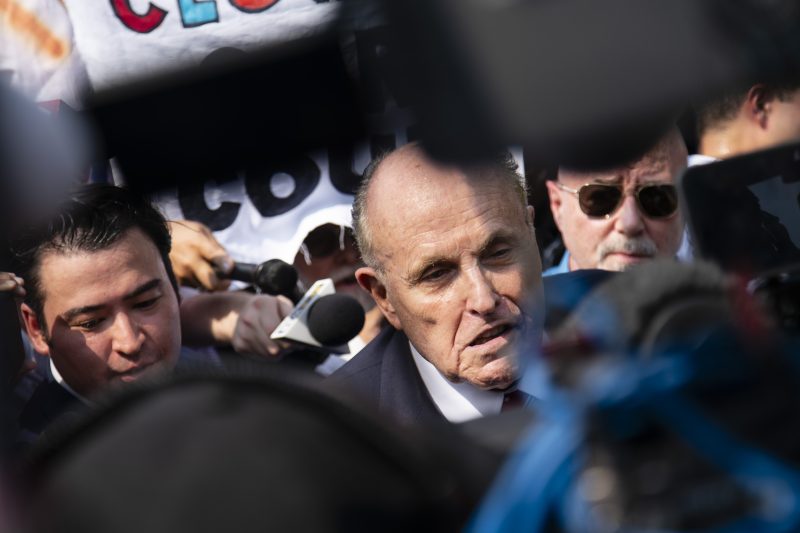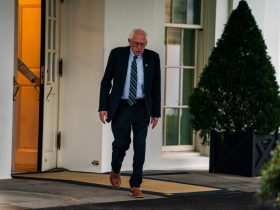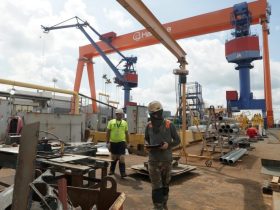The decline in the fortunes of former New York mayor Rudy Giuliani accelerated Wednesday to include the first major legal judgment against him for his bizarre efforts to overturn former president Donald Trump’s 2020 election loss.
U.S. Judge Beryl A. Howell ruled that Giuliani was liable for defaming two Georgia election workers whom he falsely accused of tampering with votes.
The decision came just a week after Giuliani surrendered in Fulton County, Ga., answering a criminal indictment that also included Trump and 17 others.
Howell took the extraordinary step of ruling against Giuliani without a trial, while saying he had deliberately shirked his obligation to turn over crucial discovery materials in the case.
In the blistering 57-page opinion, she suggested Giuliani’s failure to turn over materials was aimed at avoiding liability not just in the defamation case but more broadly — including, apparently, in the Fulton County case. She said Giuliani’s conduct left her no choice because the election workers, Ruby Freeman and Wandrea ArShaye “Shaye” Moss, were deprived of materials they needed to argue their case.
We don’t yet know how much Giuliani will ultimately be forced to pay, but Howell suggested it could be “significant.” Howell has already ordered him to pay about $132,000 in sanctions for his failures to comply with court orders. There will still be a trial to assess how much Giuliani owes Freeman and Moss in monetary damages.
The development is merely the latest example of a Trump ally suffering direct consequences and even being forced to pay up for promoting bogus voter-fraud claims. The other big one, of course, was Fox News agreeing to pay a $787.5 million settlement to Dominion Voting Systems over its defamation claims. That case also involved false Giuliani claims that Fox chose to air, despite prominent figures within the company privately deriding such claims — and deriding Giuliani personally.
Giuliani spokesman Ted Goodman called the new ruling “a prime example of the weaponization of our justice system, where the process is the punishment.” He also previewed a potential appeal, saying it “should be reversed.”
Here’s what Howell said.
At the core of Howell’s ruling is the idea that the prominent longtime lawyer and former swashbuckling federal prosecutor must have known better. She repeatedly cited Giuliani’s lengthy legal career to make the case that he had deliberately avoided his responsibility to preserve and turn over records.
“The fact that Giuliani is a sophisticated litigant with a self-professed 50 years of experience in litigation — including serving as the U.S. Attorney for the Southern District of New York — only underscores his lackluster preservation efforts,” she wrote.
She also cited this while rebuking Giuliani’s excuse that a government seizure of his devices left him unable to turn over documents.
“Given Giuliani’s much-vaunted experience as an attorney, he plainly should have known better, and had he taken the proper steps prior to or even after the FBI’s seizure of his devices, his potentially relevant [electronically stored information] could have been preserved,” Howell said.
She added that “despite Giuliani’s 50 years of experience as an attorney, he repeatedly flaunted his discovery obligations.”
She also noted that Giuliani had indicated he knew he was likely to face litigation over his fraud claims, reinforcing the idea that he should have been prepared to preserve materials.
It’s because of Giuliani’s pedigree and past comments that Howell cast Giuliani’s actions as apparently deliberate. What’s more, she provided a potential motivation: Giuliani’s broader legal liabilities, which now include an indictment.
“Giuliani’s preference may be due to the fact, about which he has made no secret, that he faces liability, both civil and criminal, in other investigations and civil lawsuits,” Howell wrote.
She added that Giuliani had “perhaps … made the calculation that his overall litigation risks are minimized by not complying with his discovery obligations in this case.”
Howell reserved some of her harshest rebukes for Giuliani’s attempts to get around discovery by recently conceding the legal point that he had defamed Freeman and Moss.
Giuliani tried to do so in two separate statements to the court, known as stipulations. But while he conceded as a legal matter that his allegations about the election workers were false, even defamatory, he also tried to claim they could be defended as protected First Amendment speech.
Howell cast these as desperate and transparent ploys.
“Giuliani’s stipulations hold more holes than Swiss cheese,” she wrote. She added that his attempt to thread the needle made clear his goal was “to delay such a fair reckoning by taking his chances on appeal, based on the abbreviated record he forced on plaintiffs.”
After Giuliani was asked to clarify his first stipulation, Howell wrote, his new one was “nearly as puzzling as his first.”
She said the stipulations made “crystal clear his choice not to provide further discovery,” which she said merited her decision.
Giuliani has already failed to pay Freeman and Moss $89,000 he was ordered to reimburse them. But Howell indicated she doesn’t buy his claims that he can’t.
She noted that Giuliani has asked for a deferment on the payments but thus far hasn’t actually filed a motion laying out his case for such a deferment, and hasn’t detailed his finances.
“Giuliani’s claim that he cannot afford to reimburse plaintiffs is especially dubious,” she said, because he recently was able to erase an estimated $320,000 in debt to a company hosting his electronic records. She also cast it as dubious because “he has apparently recently listed his three bedroom apartment in New York City for $6.5 million.”
She also suggested Giuliani’s businesses might be able to reimburse Freeman and Moss because his podcast “derives compensation based on advertising on a ‘per-view basis’ and the reach of this podcast is, according to Giuliani, ‘over a million people.’”
Perhaps most starkly, Howell said the fact that Giuliani might have derived such revenue from precisely the claims for which he’s now liable makes a strong case for “significant” damages in the trial ahead.
“Giuliani’s viewership and revenue information, particularly for episodes containing false statements concerning plaintiffs, may show that Giuliani purposefully spread false claims about plaintiffs to enrich himself,” Howell wrote, “evincing the type of outrageous conduct that would justify a significant award of punitive damages.”








